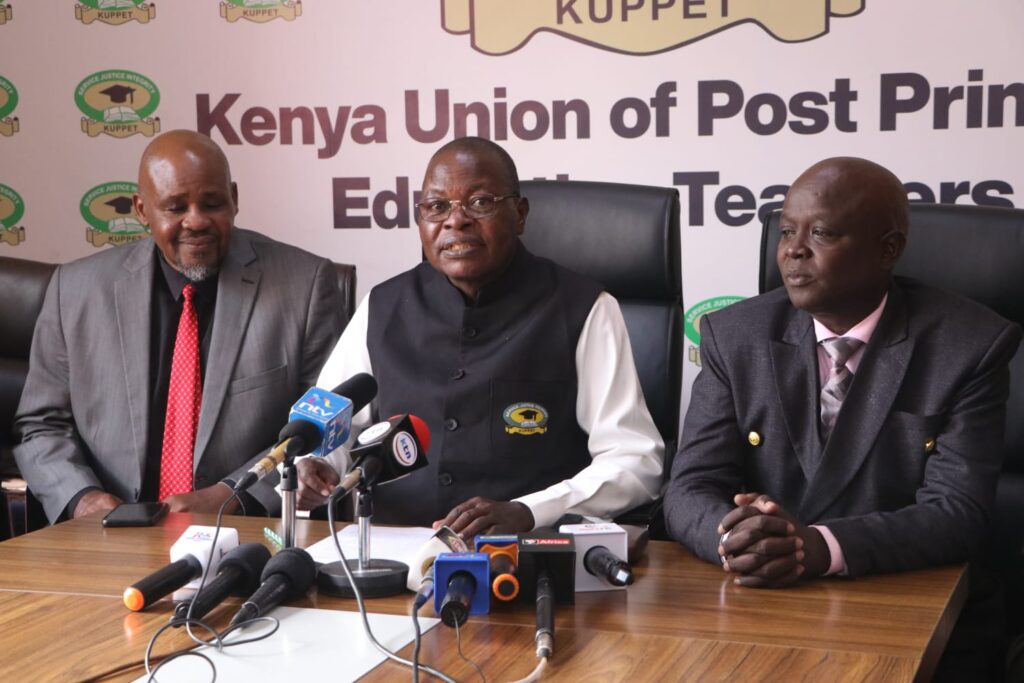
From left: KUPPET Deputy Secretary General Moses Nthurima, Secretary General Akelo Misori (centre), and National Vice Chair Julius Korir during a press briefing in Nairobi on May 14, 2025.
By Churchill Simiyu
Nairobi, Kenya – May 14, 2025 -The future of millions of Kenyan learners hangs in the balance following revelations by the Kenya Union of Post Primary Education Teachers (KUPPET) that the government’s proposed 2025–2026 budget will severely cripple the country’s education sector.
Speaking during a press briefing in Nairobi, KUPPET warned that the cuts will not only disrupt schools but also compromise the quality of education and ultimately stall Kenya’s long-term development goals. The union described the budget proposal as the most aggressive withdrawal of support for public education since independence.
According to KUPPET, the education budget faces a staggering KES 62 billion shortfall. Key areas such as the management of national exams, school quality assurance, and the modernisation of data systems have been completely defunded. KUPPET officials noted with concern that the Quality Assurance Department at the Ministry of Education may be rendered inactive, leaving no mechanisms to monitor standards in schools.
The budget cuts also target critical programs including the confirmation of 20,000 intern junior secondary school teachers, recruitment of additional teachers promised for January 2026, and funding for school feeding initiatives. These moves, KUPPET said, will widen the gap between privileged and disadvantaged learners.
KUPPET argued that by removing state support for exams and basic school operations, the government is shifting the cost burden to parents—many of whom are already struggling with a high cost of living. Without capitation funds reaching schools, learners will face interrupted learning due to a lack of essential services such as classroom materials, sanitation facilities, and proper infrastructure.
The union also raised alarm over a recent Ministry of Education circular directing junior secondary school teachers to be absorbed into primary school management systems. KUPPET rejected the directive, insisting that junior schools must be treated as autonomous institutions with their own leadership structures and program focus.
“Education is more than buildings and desks,” said a union official. “It is about investing in the people who make learning happen—teachers, administrators, and support staff—and ensuring that children from all corners of Kenya can learn in a safe, consistent, and supportive environment.”
KUPPET further accused the government of going back on its own commitments, pointing to unmet promises to hire new teachers and invest in educational infrastructure. The union warned that starving the sector of resources could set back Kenya’s progress in innovation, job creation, and global competitiveness.
As second term continues, schools across the country are already experiencing the impact of delayed funding. Reports from several counties indicate that schools have not received capitation funds, forcing headteachers to suspend basic operations or turn to parents for emergency contributions.
KUPPET is now calling on Parliament to reject the proposed budget cuts and reinstate funding to secure the future of Kenya’s children. The union urged lawmakers to treat education as a national priority and not a cost to be trimmed.
“If we want a skilled, informed, and productive society, we must start by funding the foundation education,” said the union.

More Stories
NEMA Conducts Public Forum on Draft E-Waste and Environmental Assessment Regulations
TVET and Micro-Credentials Key to Youth Employment, Says Dr. Ekrah Ndung’u
NATIONAL LAND COMMISSION CEO JOINS COUNTY FIRST LADIES FOR LAUNCH OF 2025–2028 STRATEGIC PLAN**